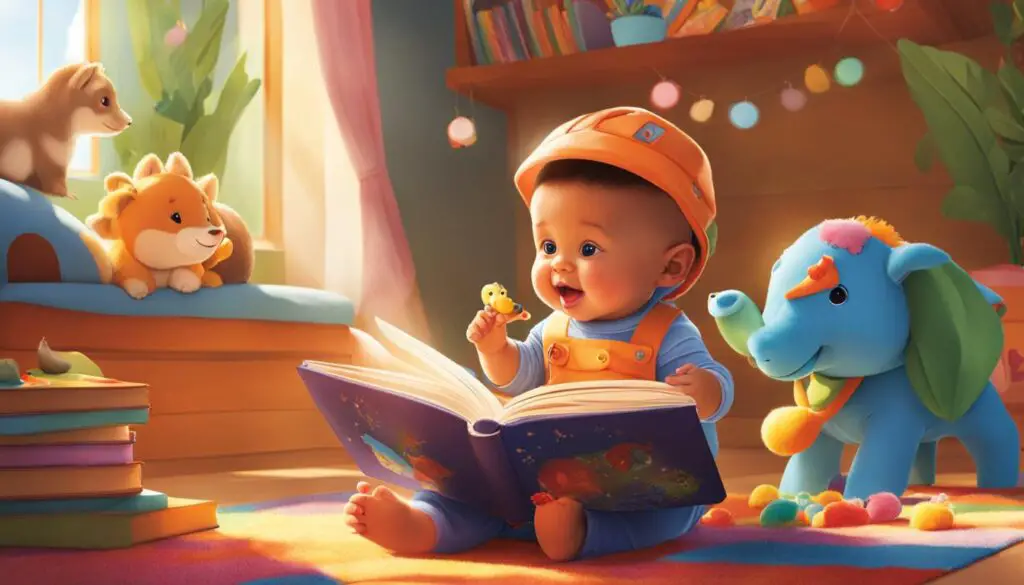
The Importance of Reading to Your Baby
When it comes to baby care, there are countless things to consider to ensure newborn health and proper child development. From infant nutrition to baby safety, feeding techniques to pediatric health, breastfeeding to baby sleep, caregivers are constantly seeking parenting advice to provide the best for their little ones.
One aspect that should never be overlooked is the importance of reading to your baby. Even though newborns can’t hold a book or know the letters of the alphabet, it’s never too early to introduce them to the wonder of books. Reading to babies provides building blocks for language development and equips them with social and emotional skills.
Studies have shown that babies who are read to every day are exposed to around 78,000 words per year, contributing to future language skills and academic success. Reading books also stimulates a baby’s imagination and helps them learn about the world. It creates an emotional connection and bonding between the caregiver and the baby.
Reading to babies and toddlers introduces uncommon vocabulary, sentence structure, rhyming, and repetition, which are important for future readers. It establishes a routine, fosters literacy, and enhances social and mental health. Not reading to babies may lead to slower speech or language skills development and behavioral problems.
Early brain development and major milestones for oral language and vocabulary happen between birth and 3 years, making it crucial to establish the habit of reading aloud daily during this period.
Key Takeaways:
- Reading to babies promotes language development and academic success.
- It stimulates imagination, learning, and emotional connection.
- Reading establishes routines, fosters literacy, and enhances social and mental health.
- Not reading to babies can lead to slower language skills development and behavioral problems.
- Establishing a habit of reading aloud daily is crucial for brain development.
Benefits of Reading to Your Baby
Reading to babies and young children has numerous benefits. First and foremost, it plays a crucial role in their language development. By exposing babies to a greater number of words and more complex language through books, reading helps expand their vocabulary and improve their communication skills. Research has shown that children who are read to regularly have better language skills and are more prepared for school.
Moreover, reading together creates a strong bond between the caregiver and the baby. As the caregiver reads aloud, the baby observes their facial expressions, tones of voice, and gestures, which aids their emotional learning and early brain development. The soothing rhythm of reading also provides a sense of safety, love, and emotional connection, contributing to the overall well-being of the baby.
Reading to babies and small children contributes to developing valuable language skills, and about a third of kids start kindergarten without the necessary language skills, making reading even more important.
In addition to language development and bonding, establishing a reading routine has its own benefits. For example, bedtime reading can help babies associate books with slowing down and preparing for sleep, making it a soothing and comforting experience. This routine not only helps establish healthy sleep habits but also fosters a love for books and reading in children from an early age.
Table: Benefits of Reading to Your Baby
| Benefits | Explanation |
|---|---|
| Language Development | Expands vocabulary and communication skills |
| Bonding | Creates emotional connection and sense of safety |
| Routines | Establishes healthy sleep habits and reading habits |
| School Success | Prepares children for kindergarten and future academic success |
It’s important to remember that reading to babies is not just about the words on the page, but about the experience of sharing stories and nurturing a love for reading. So, take some time each day to read to your baby and witness the incredible benefits it brings to their development and relationship with you.

How to Read to Your Baby
Reading to your baby is a wonderful way to foster early language development and create a bond between you and your little one. While babies may not understand the words or the story yet, they still benefit from the experience. Here are some tips to make reading to your baby a fun and engaging activity:
Tips for Reading to Your Baby
- Start early: Begin reading to your baby from birth. Even though they may not fully grasp the concept of reading, they will enjoy the soothing sound of your voice and the closeness of your presence.
- Choose the right books: Opt for board books with bright, bold pictures and simple text. These books are easy for babies to hold and explore with their hands and mouths.
- Make it interactive: Point to the pictures, name objects, and use different voices for different characters. Encourage your baby to touch the pages and feel different textures. This interactive approach keeps your baby engaged and helps them develop their sensory skills.
- Follow their lead: If your baby loses interest or becomes fussy, don’t force them to continue. Follow their cues and take breaks when needed. Remember, reading should be enjoyable for both of you.
Reading to your baby is not just about the words on the page; it’s about building a love for books and creating positive associations with reading. By incorporating these tips into your reading routine, you can help your baby develop a lifelong passion for stories and learning.

A Sample Interactive Reading Session
| Moment | Activity |
|---|---|
| 1. Before reading | Hold the book and show it to your baby. Talk about the colors and pictures on the cover. Encourage them to touch the book and feel the textures. |
| 2. During reading | Use different voices for different characters. Point to the pictures and name the objects. Ask simple questions like, “Where is the duck?” or “What color is the ball?” |
| 3. Pause for interaction | Give your baby a chance to respond and interact with the story. Let them turn the pages or point to objects they recognize. |
| 4. After reading | Talk about the story and ask questions like, “What was your favorite part?” or “Can you show me the dog?” This helps promote comprehension and memory skills. |
Remember, reading to your baby is a special time for bonding and learning. Enjoy the journey together and watch as your baby’s love for books grows.
Conclusion
Reading to your baby is of utmost importance in fostering their language development, strengthening the bond between caregiver and child, promoting cognitive growth, and cultivating healthy reading habits. From the moment they are born, exposing babies to the world of books equips them with the necessary tools for future academic success and enhances their social and mental well-being.
Establishing a regular reading routine sets a solid foundation for literacy and helps children develop vital language skills. Remember, it’s never too early or too late to start reading to your baby. Even short reading sessions can have a profound impact on their language development. By choosing age-appropriate books and making reading interactive and enjoyable, parents can instill a love for books and reading in their children.
Embrace the precious moments of reading with your baby and witness their journey as they blossom into independent readers. Through the power of stories, you can unlock their imagination, kindle their curiosity, and pave the way for a lifelong passion for learning and discovery. So, make reading a cherished part of your daily routine and watch as your baby’s language skills, cognitive abilities, and bonding with you flourish.
FAQ
Why is reading to a baby important?
Reading to babies provides building blocks for language development and equips them with social and emotional skills. It stimulates their imagination, helps them learn about the world, and creates an emotional connection between caregiver and baby.
How does reading to a baby benefit their language skills?
Reading to babies introduces them to a greater number of words and more complex language, contributing to future language skills and academic success. It also introduces uncommon vocabulary, sentence structure, rhyming, and repetition, which are important for future readers.
When should I start reading to my baby?
It is never too early to start reading to your baby. Early brain development and major milestones for oral language and vocabulary happen between birth and 3 years, making it crucial to establish the habit of reading aloud daily during this period.
How often should I read to my baby?
Reading to babies should be a daily activity of at least a few minutes. Even short sessions of reading benefit their language development. Establishing a regular reading routine sets a strong foundation for literacy and helps children develop important language skills.
How do I choose the right books for my baby?
Start with chunky board books for infants and gradually introduce books with more words and complex plots as they grow. It’s important to choose age-appropriate books that capture their attention and engage their senses.
How can I make reading interactive for my baby?
Point out pictures, ask questions about the story, and discuss what’s happening in the pictures. Repetition is beneficial, so be prepared to read the same books over and over. As children grow older, they can take turns reading and engage in discussions about the story.
What are the benefits of reading to my baby?
Reading to babies helps their language skills, creates a bond between caregiver and baby, aids emotional learning and early brain development, establishes routines, fosters literacy, and enhances social and mental health.
Is it normal if my baby doesn’t pay attention to the whole story?
Yes, it is normal for babies to not pay attention to the whole story at first. They still benefit from the sounds of the reader’s voice and enjoy the company. Follow your baby’s lead and let them explore books through their senses, such as grabbing and mouthing them.
How can reading to my baby contribute to their future academic success?
Studies have shown that babies who are read to every day are exposed to around 78,000 words per year, which contributes to future language skills and academic success. About a third of kids start kindergarten without the necessary language skills, making reading even more important.
Does not reading to babies have any negative effects?
Not reading to babies may lead to slower speech or language skills development and behavioral problems. Early intervention through reading can help mitigate these effects and promote healthy language development.